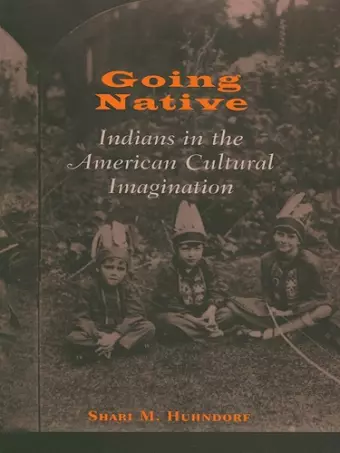Going Native
Indians in the American Cultural Imagination
Format:Paperback
Publisher:Cornell University Press
Published:13th Feb '01
Currently unavailable, and unfortunately no date known when it will be back
This paperback is available in another edition too:
- Hardback£108.00(9780801438325)

Since the 1800's, many European Americans have relied on Native Americans as models for their own national, racial, and gender identities. Displays of this impulse include world's fairs, fraternal organizations, and films such as Dances with Wolves. Shari M. Huhndorf uses cultural artifacts such as these to examine the phenomenon of "going native," showing its complex relations to social crises in the broader American society—including those posed by the rise of industrial capitalism, the completion of the military conquest of Native America, and feminist and civil rights activism.
Huhndorf looks at several modern cultural manifestations of the desire of European Americans to emulate Native Americans. Some are quite pervasive, as is clear from the continuing, if controversial, existence of fraternal organizations for young and old which rely upon "Indian" costumes and rituals. Another fascinating example is the process by which Arctic travelers "went Eskimo," as Huhndorf describes in her readings of Robert Flaherty's travel narrative My Eskimo Friends and his documentary film Nanook of the North. Huhndorf asserts that European Americans' appropriation of Native identities is not a thing of the past, and she takes a skeptical look at the "tribes" beloved of New Age devotees.
Going Native shows how even seemingly harmless images of Native Americans can articulate and reinforce a range of power relations including slavery, patriarchy, and the continued oppression of Native Americans. Huhndorf reconsiders the cultural importance and political implications of the history of the impersonation of Indian identity in light of continuing debates over race, gender, and colonialism in American culture.
Going Native will be graciously welcomed into American Indian Studies and the study of colonialism/imperialism. Huhndorf's detailed research and methodology are important contributions to American Indian Studies because they allow for the examination of cultural texts and social positions of power without having to resort to arguments of what is authentic and non-authentic Indian culture.
* H-Net Reviews *For teachers, Going Native provides a wealth of examples we might bring into the classroom, as well as a critique of identity politics that students will find interesting.... As a Native person working in academia, I am heartened by an inquiry that uses white representations of nonwhite peoples to examine European American identity and insists on applying identity theory to the dominant culture.
-- Katy Gray Brown * Hypatia *Huhndorf's shrewd analysis goes beyond simply identifying and then castigating those European Americans who have disregarded the repercussions of their cultural appropriation. The result is that Going Native persuasively demonstrates how such acts can be much more revealing of their historical moment then they at first might seem.
* American Literature *Teaching American Indian history, more than other courses, demands attention to the politics of representation. Non-native students are likely to be completely unfamiliar with the historical material presented to them and, at the same time, to feel an ownership and strong attachment to particular images of Indians. As Shari M. Huhndorf argues in Going Native, the racial dynamics of conquest, encoded into popular culture, are still very much central to non-native American identity. For this compelling reason, this book is a useful and imaginative addition to the literature on Indian-white relations.
* Journal of American History *The book's central focus is the eradication of an old, and the birth of a new, nation. It is about the origins and significance of manifest destiny—perhaps the most original analysis of that process I have seen.... This is a fascinating book and the opening quotation by Vine Deloria on how Indians haunt the collective unconscious of the white man sets the tone for a lively read.... It is an important contribution to the literature on a topic that deserves much more public debate.
* Cultural Survival QuarterISBN: 9780801486951
Dimensions: 229mm x 152mm x 18mm
Weight: 454g
240 pages